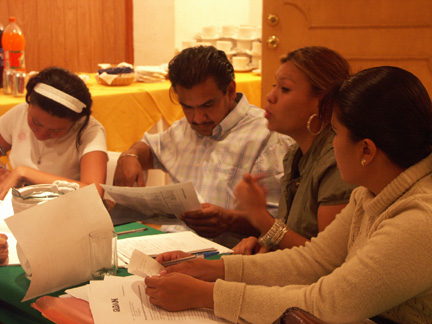WELCOME TO THE ARCHIVE (1994-2014) OF THE MAQUILA SOLIDARITY NETWORK. For current information on our ongoing work on the living wage, women's labour rights, freedom of association, corporate accountability and Bangladesh fire and safety, please visit our new website, launched in October, 2015: www.maquilasolidarity.org
March 23, 2007

Representatives of labour rights and women’s organizations from different garment producing regions in Mexico came together for a workshop of the Espacio de Reflexión y Alternativas para la Industria del Vestido (Space for Reflection and Alternatives for the Garment Industry).
The Espacio is a new Mexican network, with which MSN has been working closely, that offers local and national labour rights and women’s groups a space to share experiences and knowledge on the impacts of trade liberalization on Mexican garment workers and their communities, and to develop alternative strategies.
The March workshop, entitled “Closures and labour rights violations: How to respond?”, brought together members of more than 10 organizations to explore case studies, hear presentations on the trends in the Mexican and international garment industry since the end of the Multi-Fibre Arrangement, and to discuss possible strategies to challenge the negative impacts of trade liberalization and industry restructuring.
The groups in the network are facing a growing number of closures of garment factories as brands shift orders and foreign investors shift production to Central America and Asia, where labour costs are even cheaper than in Mexico. The workshop focused on three recent cases – Hanesbrands and Gildan Activewear in in Coahuila, and Jordache Enterprises in the Yucatan. As part of the follow-up from the workshop the network is developing proposals to brands, manufacturers and state and federal governments to mitigate the impacts of closures on workers and their communities.
Presentations and resource materials from the workshop will be available (in Spanish) on our website shortly.
To better facilitate our work in Mexico, MSN now has a small office in Mexico City, in the office of Association for Women’s Rights in Development (AWID). Our two part-time Mexico team members are working closely with members of the Espacio on particular cases of factory closures in their communities.
MSN is helping to bridge the gap between local labour rights groups and international brand buyers, assisting the local Mexican groups in bringing reports of worker rights violations to the brands’ attention and lobbying for corrective action.
For instance, MSN is currently facilitating meetings between CEPRODEHL, our partner group in Merida, Yucatan, and two US-based brands concerning the irresponsible practices of one of the suppliers during factory closures in that region. MSN has also been working closely with SEDEPAC, our partner in Coahuila, lobbying Hanesbrands and Gildan Activewear to provide decent compensation, retraining and job search assistance to workers left unemployed when the companies closed factories in the state.
In 2006, the Espacio network met together twice – in Merida, Yucatan in March and in Mexico City in August.
As follow-up to MSN’s 2005 Asia/Latin America Women’s Exchange in Bangkok, May Wong from the Hong-Kong based Asia Monitor Resource Centre (AMRC) participated in the August workshop and in a public forum, and acted as a resource person on labour rights in China for both events. The goal was to demystify China’s “threat” to jobs and labour rights in Mexico. May’s program included an exchange and exposure visit to Tehuacan, Puebla, a major jean manufacturing centre.